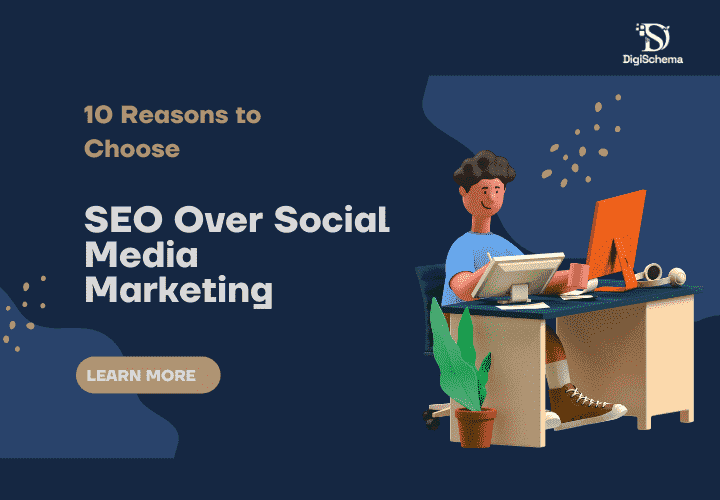10 Reasons to Choose SEO Over Social Media Marketing
When businesses seek to amplify their online presence, they often face a critical decision: Should they invest in Search Engine Optimization (SEO) or Social Media Marketing (SMM)? While both strategies offer significant benefits, choosing the right approach can depend on your specific goals and resources. Here are ten reasons why SEO might be the more advantageous choice compared to social media marketing.

1. Long-Term Results vs. Short-Term Gains
SEO vs Social Media Marketing often comes down to the timeline of results. SEO is designed to improve your website’s visibility on search engines over time. Once your SEO efforts start to pay off, you can enjoy sustainable, long-term traffic. In contrast, social media marketing often yields quicker results but typically requires ongoing investment to maintain and build engagement.
2. Higher Conversion Rates
When comparing SEO vs Social Media, SEO generally leads to higher conversion rates. Users who find your website through search engines are often actively searching for solutions or products, making them more likely to convert into customers. Social media platforms are typically used for browsing or socializing, which can result in lower conversion rates.
3. Better ROI
In the debate of SEM vs Social Media Marketing, SEO usually offers a better return on investment (ROI). Although SEO requires an upfront investment in terms of time and resources, the long-term benefits often outweigh the costs. Once your website ranks well, you can attract organic traffic without ongoing advertising expenses. Social media marketing, however, often involves continuous ad spend and content creation to sustain visibility and engagement.
4. Targeted Traffic
SEO enables you to target users who are actively searching for specific keywords related to your business. This means the traffic you attract is highly targeted and relevant. Social media marketing, on the other hand, may reach a broader audience but lacks the precision of targeting users based on their search intent.
5. Enhanced Credibility and Trust
Search engines like Google are trusted sources of information for users. When your website ranks high in search results, it is often perceived as more credible and trustworthy. In contrast, social media platforms are less likely to be associated with trustworthiness, as they are seen more as platforms for social interaction rather than authoritative sources.
6. Longevity of Content
Content created for SEO has a longer shelf life compared to social media content. SEO content, such as blog posts or articles, can continue to attract organic traffic long after it is published. Social media posts, however, have a relatively short lifespan and may require frequent updates to maintain engagement and visibility.
7. Cost-Effectiveness
Although SEO requires investment in expertise and tools, it is often more cost-effective over time compared to social media marketing. Social media advertising requires continuous budget allocation for ads, sponsored posts, and promotional campaigns. With SEO, once your site achieves good rankings, the ongoing cost is lower as organic traffic doesn’t require a constant financial investment.
8. Higher Quality Traffic
SEO generally attracts higher quality traffic as it brings users who are specifically searching for what you offer. These users are often further along in the buying process and are more likely to make a purchase. Social media traffic can be more varied in quality since users may not be in the mindset to make immediate purchasing decisions.
9. Measurable Success
Both SEO and social media marketing provide metrics to measure success, but SEO often offers clearer indicators of performance. With tools like Google Analytics, you can track keyword rankings, organic traffic, and conversion rates. While social media analytics can offer insights into engagement and reach, it may be more challenging to directly correlate these metrics with actual business outcomes.
10. Improved User Experience
SEO emphasizes improving the overall user experience on your website. Factors like page speed, mobile-friendliness, and site structure are crucial for ranking well in search engines and providing a seamless experience for visitors. Social media marketing focuses more on engagement and content dissemination, which may not directly enhance the user experience on your website.

